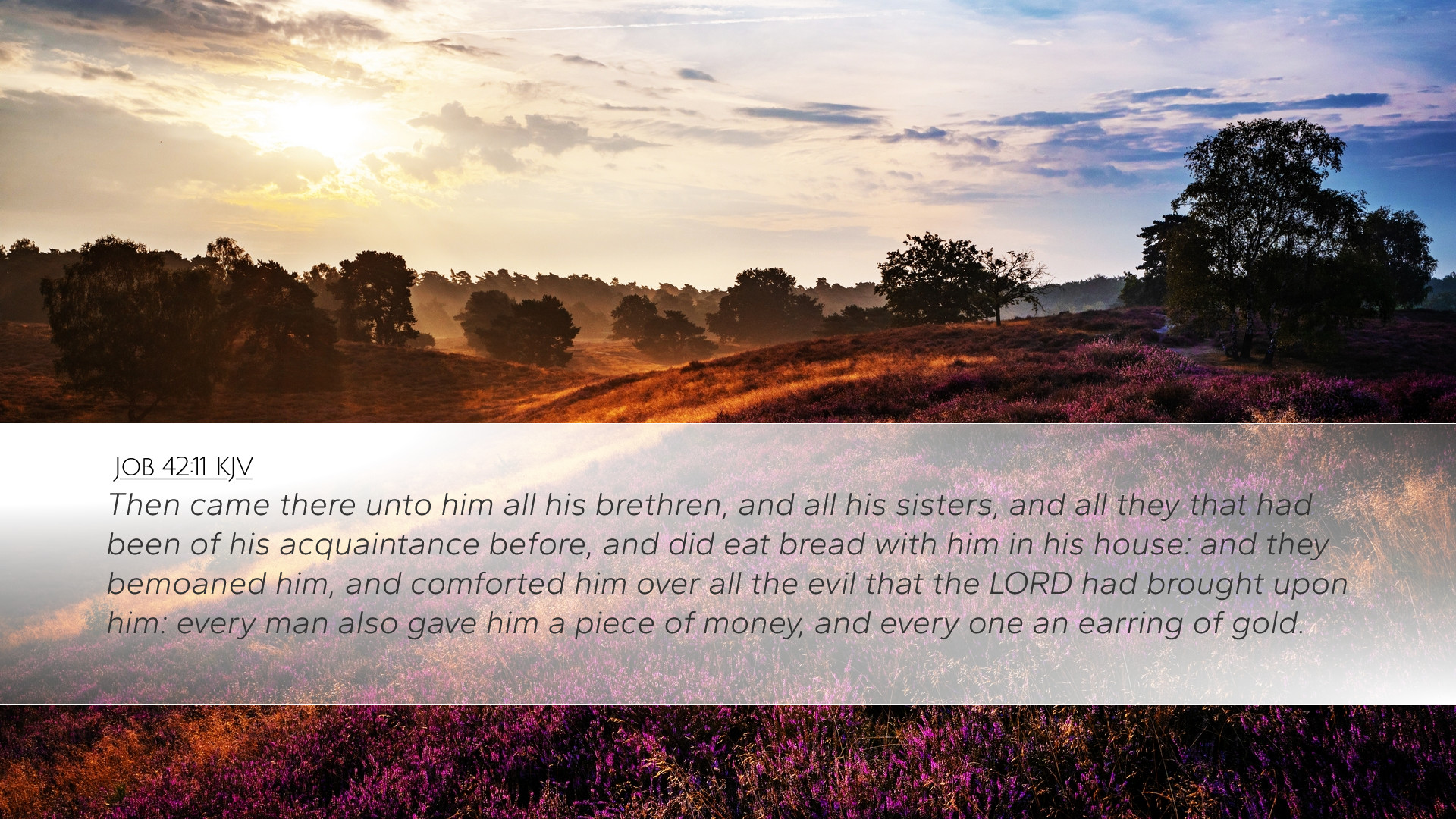Old Testament
Genesis Exodus Leviticus Numbers Deuteronomy Joshua Judges Ruth 1 Samuel 2 Samuel 1 Kings 2 Kings 1 Chronicles 2 Chronicles Ezra Nehemiah Esther Job Psalms Proverbs Ecclesiastes Song of Solomon Isaiah Jeremiah Lamentations Ezekiel Daniel Hosea Joel Amos Obadiah Jonah Micah Nahum Habakkuk Zephaniah Haggai Zechariah MalachiJob 42:11
Job 42:11 KJV
Then came there unto him all his brethren, and all his sisters, and all they that had been of his acquaintance before, and did eat bread with him in his house: and they bemoaned him, and comforted him over all the evil that the LORD had brought upon him: every man also gave him a piece of money, and every one an earring of gold.
Job 42:11 Bible Commentary
Commentary on Job 42:11
Job 42:11 states: "Then came there unto him all his brethren, and all his sisters, and all they that had been of his acquaintance before, and did eat bread with him in his house: and they bemoaned him, and comforted him over all the evil that the LORD had brought upon him: every man also gave him a piece of money, and every one an earring of gold."
Contextual Overview
The book of Job addresses profound issues of suffering, divine justice, and restoration. By Job 42, we witness the culmination of Job's trials, his profound conversation with God, and finally, his restoration. This verse encapsulates a pivotal moment in Job's life, highlighting the support of his friends and family after immense suffering.
Exegesis and Analysis
In this passage, we witness a key transition from Job's suffering to his restoration. The actions of his friends and family illustrate several theological and relational themes vital for understanding the entirety of the book of Job.
The Role of Community in Suffering
Job's Support System: The return of Job's brethren and sisters signifies a restoration of community ties. Matthew Henry notes the importance of companionship during trials, emphasizing that "friends that have been absent in our troubles may be allowed to come and comfort us when the storm has passed." This reflects the biblical principle that no individual is an island; we are created for fellowship.
Comfort and Mourning
The Response to Suffering: The act of mourning indicates empathy and shared sorrow in the face of tragedy. Albert Barnes highlights that the mourners expressed not only their sympathy but also their acknowledgment of Job's suffering as divinely appointed. They came to comfort him over "all the evil that the LORD had brought upon him," indicating a strong theological understanding of divine sovereignty in suffering.
Restoration and Finances
Gifts of Gold: The gifts—“a piece of money” and “an earring of gold”—symbolize restoration and acknowledgment of honor lost during Job's trials. According to Adam Clarke, these offerings signify a communal participation in Job’s restoration, suggesting that the community, through their gifts, recognized not only Job’s suffering but also his prior loss of dignity and material wealth.
Theological Implications
This passage speaks volumes about the nature of God’s restoration. The act of receiving comfort and gifts signifies that God’s favor and blessing can return, even after profound suffering.
Sovereignty of God
Job's acknowledgment of God's hand throughout his suffering culminates in a profound realization that divine sovereignty is consistent even in hardship. Job's story illustrates that suffering does not equate to divine wrath, as highlighted in the writings of earlier commentators.
The Community's Role in Restoration
The narrative indicates that God often employs human means—friends, family, community—as instruments of healing. Theologians emphasize that our suffering can lead to opportunities for others to express grace, compassion, and restoration, much like Job experienced.
Practical Applications
- Empathy in Ministry: Pastors and church leaders can learn the importance of being present in times of suffering, providing both emotional and spiritual support.
- Encouraging Community: The church should foster a culture of openness where members can share their burdens and offer comfort to one another.
- Understanding Suffering: It is vital for believers to recognize suffering as part of the Christian experience that can lead to growth and deeper understanding of God's sovereignty.
Conclusion
Job 42:11 serves as a poignant reminder of the intertwining of divine sovereignty and human empathy. Understanding the depth of this passage allows pastors, students, and theologians to grasp the transformative power of community in the face of suffering and restore believers' hope in God's overarching plan. The book of Job, culminating with this verse, encourages believers to lean into their faith, recognizing that restoration is possible through God’s grace and the love of community.


